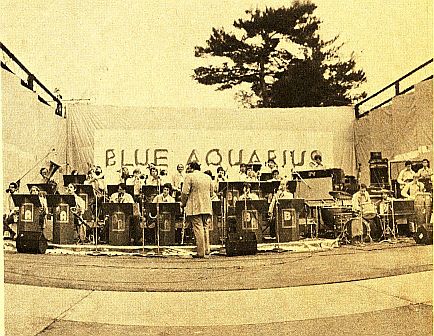The Free Sound of Blue Aquarius

 Blue Aquarius is the brainchild of one individual: Bhole Ji. Six months ago, when Guru Maharaj Ji announced he wanted a festival in England in June. Bhole Ji was studying in London. Alexandra Palace, the largest building in England, was obtained for the festival. It holds 20,000 people. Bhole Ji immediately decided he had better get a big band together to provide enough music to reach all those people. So he sent out word that he would form a band with the best musicians among Guru Maharaj Ji's six million devotees.
Blue Aquarius is the brainchild of one individual: Bhole Ji. Six months ago, when Guru Maharaj Ji announced he wanted a festival in England in June. Bhole Ji was studying in London. Alexandra Palace, the largest building in England, was obtained for the festival. It holds 20,000 people. Bhole Ji immediately decided he had better get a big band together to provide enough music to reach all those people. So he sent out word that he would form a band with the best musicians among Guru Maharaj Ji's six million devotees.
Musicians from America flew into London and went straight to meet with Bhole Ji, as did musicians from France, Amsterdam, West Germany, Ireland and Wales. Starting with a nucleus made up of members of the Anand Band, the London based devotional rock band which recorded the Lord of the Universe album, Bhole Ji began auditioning. ing.
At the Festival in London, Bhole Ji brought Blue Aquarius before the public for the first time. They had the 20,000 strong crowd out of their seats and everyone was dancing and clapping along with them. Each of the three nights of the festival, the crowd demanded several encores. Bhole Ji displayed his undeniable rapport with this "live-wire" band, leading them from one dynamite song to the next. Most of their music was entirely original, and the styles ranged from one end to the other of the music spectrum.
Shortly after their first public appearance, Blue Aquarius made two appearances in the Hammersmith Odeon, London. This hall is a historic place in the British rock and roll world. Every single top name act has performed there at some time or another during its career. Thus it was fitting that Blue Aquarius should perform there for their second public appearance.
After the London engagements Bhole Ji immediately turned his gaze to the Millennium '73 festival scheduled to be held in Houston within four months. He flew the entire band to Houston and set up shop there.
Shri Bhole Ji
What's it like to be in Blue Aquarius?
As the 50 members of Bhole Ji's band prepared for Soul Rush and Millennium they lived together on the first floor of the "Rainbow Inn," Houston's 300-member ashram. Because of the volumes of music to be perfected before November, the band members practiced in sectional rehearsal during the day and came together as a full band in the evenings instead of going to satsang, rehearsing with Bhole Ji far into the night. "There is so much service to be done," said Allan Thomas, vocalist. "Bhole Ji has told us that our service must become satsang for now."
The experience of being in Blue Aquarius is actually the story of the band's relationship to Bhole Ji. More important than their roles as musicians, the members of Blue Aquarius think of themselves as Bhole Ji's tools to spread Knowledge. To a man, the band declares that they "all love him very, very much." "That's just words." said Polly Bolton, vocalist. "We can't even begin to say how much we love him."
A subtle exchange takes place between Bhole Ji and his band as they communicate with music. "You must understand that Bhole Ji is not a conductor - he is the music itself," explains Erika Andersen, trumpeter. "He plays us. If we try to be a musician, we freak out. If we meditate and let him play through us, it's alright."
Without Bhole Ji, the band is fairly good. With him, it is incredible. "Without his presence, without his energy there, it's just a big jam session," said Allan.
The band's relationship to Bhole Ji is much more than that of musicians facing the physical manifestation of music. Each member receives personal strength and guidance from Bhole Ji. "He's like our father," said one. "He looks after us in every way, knows everything about us, helps us out when we're freaking out, tears down our egos with such infinite mercy, and he doesn't have to say a word, he just looks at us and his love comes through." The exchange is not one of words. A look from Bhole Ji is like looking into the mirror of your soul. Said Allan, "Bhole Ji destroys your mind with complete love. A glance from him tells you where you're at and where he wants to take you."
"When he looks at me, with such selflessness and humility," said another, "I see all my own greed and pride rising up, and want so much to become pure enough to be able to look back."
"When not conducting, Bhole Ji appears almost shy in public, speaking little and humble in behavior, but he is constantly surrounded by premies. "Premies are his friends," said one band member. "He doesn't care how undevoted you are - he loves you anyway. He's destroying all our faults with such infinite love, such total compassion, such humility and gentleness - I'm just amazed everyday with how much he gives to us."
 The band members see Bhole Ji as a perfect example of devotion and manifest love. They feel as if they have been graced far beyond what they could deserve by his darshan in every rehearsal and are "eternally grateful" for this gift and for what they learn from him. "Bhole Ji teaches us how to surrender to Guru Maharaj Ji," said one. "He makes everything else foolish so that Guru Maharaj Ji is the only alternative. His life's ambition is to serve Guru Maharaj Ji, and he's giving us personal, hand-tailored lessons in devotion by his example."
The band members see Bhole Ji as a perfect example of devotion and manifest love. They feel as if they have been graced far beyond what they could deserve by his darshan in every rehearsal and are "eternally grateful" for this gift and for what they learn from him. "Bhole Ji teaches us how to surrender to Guru Maharaj Ji," said one. "He makes everything else foolish so that Guru Maharaj Ji is the only alternative. His life's ambition is to serve Guru Maharaj Ji, and he's giving us personal, hand-tailored lessons in devotion by his example."
The band shares Bhole Ji's love with audiences whenever they give a concert. One musician described the music of Bhole Ji's band as being the manifest sound of the life-sustaining vibration of the Word. Bhole Ji's love, and the love of the band for him, is obvious in concert. "They do it all for him," commented one critic. "They literally worship their conductor."
Blue Aquarius, then, is a musical love affair between the Lord and his devotees. "I'm totally in love with Bhole Ji," said Erika. "but that's nowhere near the love he gives us. If only I could tell you…"